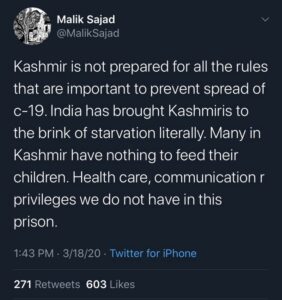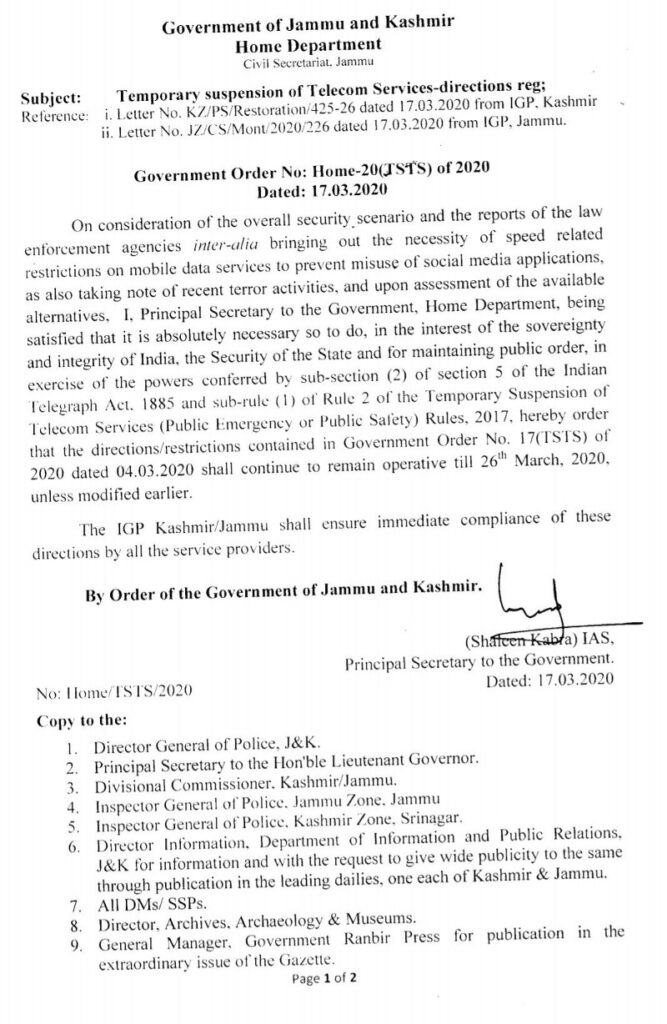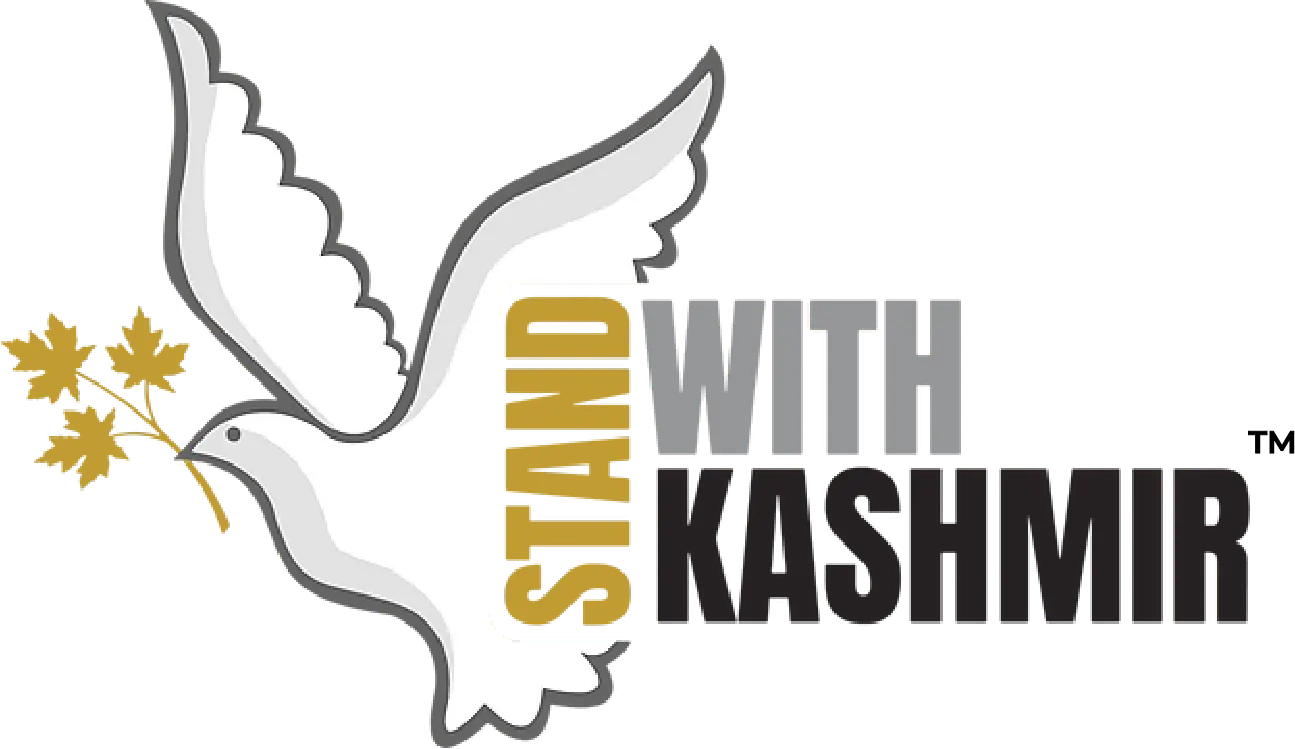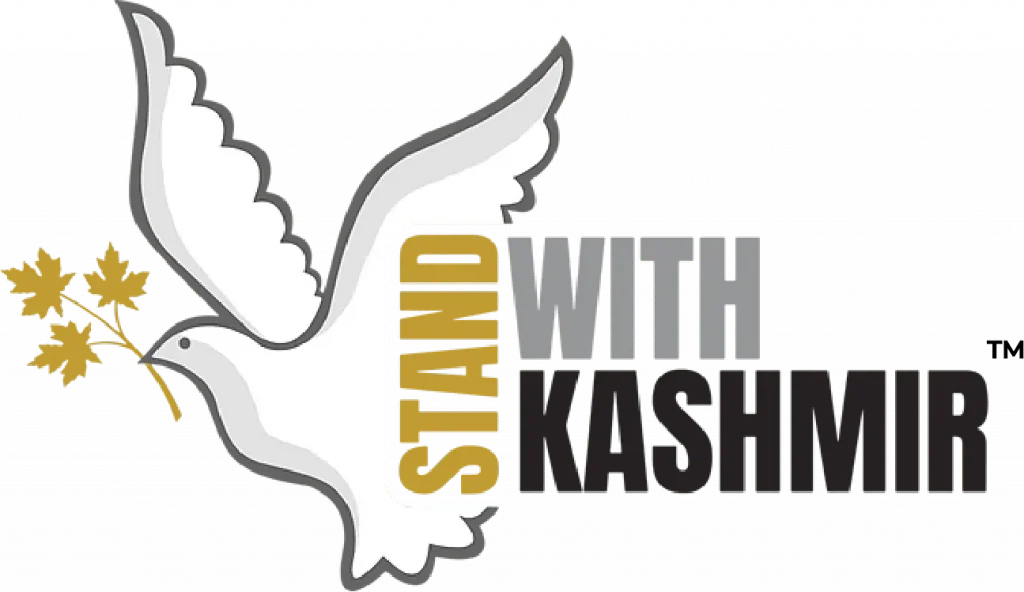Amid COVID-19 Pandemic, Over 170 Academics from Around the World Demand India Restore High-Speed Internet, Release Kashmiri Political Prisoners
The following letter was sent from the Kashmir Scholars Consultative and Action Network (KSCAN) and Concerned Academics & Professionals from around the world to the World Health Organization, UN Special Rapporteurs, and various international health organizations. You can view the official letter here.

We the undersigned would like to bring to your notice the debilitating communications lockdown that has been in place in Indian-controlled Kashmir for the past seven months. Despite the region reporting multiple positive cases of Covid-19, the Indian government has, criminally, barred residents from accessing reliable, high-speed internet. Only recently, through an administrative diktat, the Indian authorities extended the ban on high-speed internet until 26th of March.

Residents constantly report the unreliability and slowness of low-speed internet (2G) in opening basic web pages, let alone using it for data-heavy purposes like accessing medical and educational resources.
As a reminder, the maximum speed of 2G is about 50 Kbps; that of a 4G network, the current global standard, when the device is moving is 100 Mbps and 1 Gbps when the caller is stationary or walking. That means, even in these times of a global pandemic — where timely access to critical information by the doctors and the public might be a key to survival — India is punishing Kashmiris via an internet 2,000 to 20,000 times slower than the rest of the world. The actions of the Indian government constitute denial of critical and humanitarian assistance and as such are criminal and a breach of the Geneva Conventions. The centrality of a reliable communications channel in tackling this global pandemic cannot be overstated, as was recently expressed by the UN Human Rights Special Rapporteurs.
Eight Million People Can’t Get News About The Coronavirus Because Their Government Is Slowing Down…
Apart from allowing individuals and families to access the latest information on how to keep themselves safe from the Corona virus, high-speed internet allows healthcare professionals to be aware of the latest information regarding managing the impending medical crisis as well as to stay in touch with their colleagues around the globe for advice.
As we are already seeing in countries across Europe and America, reliable internet also allows day-to-day economic and educational functions to operate substantially during any social-distancing measures, which are central to preventing community spread of this highly contagious disease. It is also urgent to bring to your attention the plight of hundreds of Kashmiri political prisoners, who remain detained in unhygienic conditions in various jails in Kashmir and across India, and are therefore at a grave and increased risk of infection. Global health experts have urged the immediate release of prisoners, and we second these calls.
Given that the transnational, well-respected group Genocide Watch has already placed Kashmir on Genocide Alert, the genocidal intent of the Indian state is already established. Some of the public information being distributed by the Indian state wrongly indicates that asymptomatic people who arrive from areas of contagion or who have been in close proximity to people infected with Covid-19 are “safe” and do not require testing. Moreover, many people arriving from high-infection areas were not tested at the Srinagar airport. The first Kashmiri presenting Covid-19 returned from Saudi Arabia on March 16th, and was tested positive only on March 18th. The range of contagion during those two very critical days could have been limited and prevented by strict quarantine, but it was not. Add to this, the uniquely cruel punishment of a deliberately slow internet. The negligence of the Indian State towards Kashmiris’ safety can be explicitly seen as criminal and in fact, genocidal.
Through your good offices, we — the multiple Kashmiri and non-Kashmiri scholars, medical as well as public healthcare professionals and academics living across the globe — urge the Indian government to immediately restore high-speed internet connectivity in the region and, unconditionally, release all Kashmiri political prisoners. As Kashmir heads into this pandemic with a severely underdeveloped public health infrastructure and healthcare system, as result of decades of militarization, it is imperative that the Indian government allow its residents to make use of virtual technologies to their maximum potential in order to alleviate the dreadful impact of this virus. Ensuring the alleviation of the pandemic in Kashmir is urgent for Kashmiris as well as for the region and the world.
Thank you for your time and attention.
For more resources, please read through the following articles:
- Coronavirus cases are being missed in Kashmir because of inadequate testing, claim doctors
- Doctors in Indian administered Kashmir believe the authorities could have facilitated the spread of deadly coronavirus…
- Kashmiri leaders aren’t the only ones held under PSA – young men are languishing in faraway jails
- When the Modi government scrapped the special status of Jammu and Kashmir on August 5, placing the region under…
Signatories:
- Dean Accardi, Assistant Professor of History, Connecticut College, USA
- Binish Ahmed, Ph.D. Candidate, Ryerson University, Toronto, Canada
- Omer Aijazi, Postdoctoral Fellow, University of Toronto, Canada
- Dibyesh Anand, Professor of International Relations, University of Westminster, UK
- Mirza Saaib Beg, Lawyer, London, UK
- Mona Bhan, Associate Professor of Anthropology and the Ford Maxwell Professor of South Asian Studies, Syracuse University, USA
- Emma Brännlund, Senior Lecturer in Politics and International Relations, University of the West of England (UWE Bristol), UK
- Farhan Mujahid Chak, Associate Professor, Qatar University, Qatar
- Angana Chatterji, University of California, Berkeley
- Huma Dar, Adjunct Professor, California College of Arts, USA
- Haley Duschinski, Associate Professor, Ohio University, USA
- Iffat Fatima, Filmmaker, India
- Mohammed Tahir Ganie, Assistant Professor, School of Law and Government, Dublin City University, Ireland
- Javaid Hayat Khan, Ph. D. Independent Researcher and Analyst, Edmonton, Alberta, Canada
- Serena Hussain, Associate Professor, Coventry University, UK
- Khushdeep Kaur, Ph.D. Candidate, Temple University, USA
- Nitasha Kaul, Associate Professor, University of Westminster, UK
- Shrimoyee Nandini Ghosh, Lawyer and Legal Researcher, India
- Mohamad Junaid, Assistant Professor, Massachusetts College of Liberal Arts, USA
- Hafsa Kanjwal, Assistant Professor of History, Lafayette College, USA
- Mir Fatimah Kanth, Ph.D. Student, University of California, San Diego, USA
- Ain Ul Khair, Central European University
- Suvir Kaul, A.M. Rosenthal Professor, Department of English, University of Pennsylvania, USA
- Zunaira Komal, Ph.D. Candidate, University of California, Davis, USA
- Fozia Nazir Lone, Associate Professor of International Law, City University of Hong Kong, Hong Kong
- Laura Lucia Notaro, Consultant, Sustainable Development, Milan, Italy
- Inshah Malik, Assistant Professor, Kardan University, Kabul, Afghanistan
- Deepti Misri, Associate Professor, University of Colorado, Boulder, USA
- Preetika Nanda, Research Scholar, India
- Raja Qaiser Ahmad, Quaid-i-Azam University, Islamabad, Pakistan
- Immad Nazir, Research Scholar, University of Erlangen-Nuremberg, Germany
- Goldie Osuri, Associate Professor, University of Warwick, UK
- Idrisa Pandit, Independent Scholar, Waterloo, Canada
- Samina Raja, Professor, University of Buffalo, USA
- Torrun Arnsten Sajjad, Department of Community Medicine and Global Health, University of Oslo, Norway
- Mehroosh Tak., Lecturer, Royal Veterinary College, London, UK
- Nishita Trisal, Ph.D. Candidate, University of Michigan, Ann Arbor, USA
- Saiba Varma, Assistant Professor, University of California, San Diego, USA
- Haris Zargar, Ph.D. Candidate, International Institute of Social Sciences, The Hague, Netherlands
- Ather Zia, Assistant Professor, University of Northern Colorado, USA
- Mirza Waheed, Novelist, London
- Dr Priyamvada Gopal, Cambridge University
- Khawaja Khalid Rauf, IT Admin. Hamburg, Germany
- Aamir Rashid Najar, IT consultant, Hamburg, Germany
- Tavseef Mairaj, PhD candidate, Hamburg University of Technology, Germany
- Mudasir Wazir, Frankfurt am Main, Germany
- Umar Lateef Misgar, University of Westminster, London
- Ikram Ullah, University of Marburg, Germany
- Ramya Maddali, Académie d’Orléans-Tours, Orléans, France
- Aashna Jamal, Economist, Timor-Leste
- Hashim Syed, Visual Anthropologist, University of Münster, Germany
- Zara Bakshi, Researcher, Ashoka University
- Annapurna Menon, University of Westminster, London
- Suhail Yousuf, PhD, Heidelberg University Medical Center and German Cancer Research Center, Germany
- Pooja Krishnakumar, PhD candidate, SOAS, University of London, United Kingdom
- Saima Rashid, Post-Grad student, Istanbul Sabahattin Zaim University, Istanbul, Turkey
- Tara Vidisha Ghose, SOAS University of London, United Kingdom
- Tara Bhat, SOAS University of London, London, United Kingdom
- Maya Bhardwaj, SOAS — University of London, UK
- Gehna Kapoor
- Saquib Farooq, University of Fribourg, Switzerland.
- Dr. Haneen Bég, Kumudini Womens Medical College and Hospital, Bangladesh
- Aruna Chaudhuri, London, United Kingdom
- Waseem Malik, Zakir Husain Centre for Educational Studies, JNU, India.
- Rabia Latif Khan, PhD candidate, SOAS, University of London
- Syed Burhan Gilani, MBBS student, Bolan Medical College, Quetta
- Ummi Ammarah, Joint PhD student between KU Leuven, Belgium and University of Turin, Italy.
- Arshita Nandan
- Tanvi Surana, London School of Economics and Political Science, UK.
- Huma Raiel Assad, Junior Research Fellow, Indian Institute of Sciences, Bangalore
- Sarah Lina Ewald, PhD candidate, University of Tübingen, Germany
- Abhishek Mukhopadhyay, France
- Burooj Ghani, PhD Candidate, University of Göttingen, Germany
- Iffat Rashid, University of Oxford, United Kingdom
- Faisal Wani, PhD candidate, Delft University of Technology, Netherlands.
- Alia Andleeb, University of East Anglia, UK
- Shams Rehman, JKTV Live
Stay In Touch With Stand With Kashmir.
Stand With Kashmir (SWK) is a Kashmiri diaspora-driven independent, transnational, grassroots movement committed to standing in solidarity with the people of Indian occupied Kashmir in ending the Indian occupation of their homeland and supporting the right to self-determination of the pre-partition state of Jammu and Kashmir. We want to hear from you. If you have general inquiries, suggestions, or concerns, please email us at info@standwithkashmir.org.
©2025 StandWithKashmir All rights reserved. SWK is a 501(c)(3) non-for-profit organization.


Leave a Reply